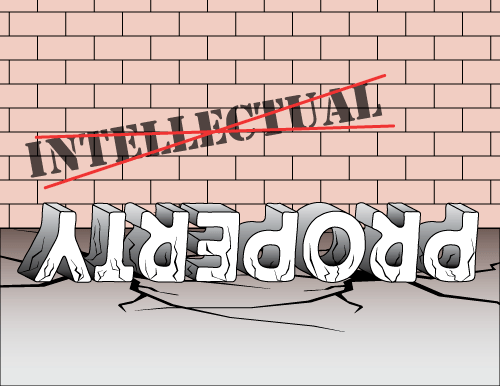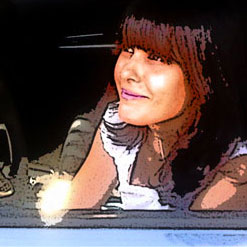It should be somewhat obvious that nobody can really “own” an idea, right? An idea has no tangible existence. Ideas are not created either, they are discovered. This means that they are potentially available to any mind that bothers to think. Two people can discover the very same idea at the same time. Or at different times. If someone “gives away” an idea, he doesn’t lose it. It’s still part of his understanding, even as that understanding now also takes shape in the mind of another. Two people can use an idea without either of them suffering a loss. Ideas can be kept secret. But once they are shared, there is no way to take them back.
Real property is not like this. If you have a cup of coffee, you lose if someone else drinks it. If you are wearing a t-shirt, you lose if someone else wears it. Property is what’s known as “zero-sum”. Two people cannot use it at the same time. If one has it, the other doesn’t. Zero-sum.
Property is essential to life. Food, shelter, clothing, are essential to life. The portion of it that is yours cannot be anyone else’s and still be yours. Property is essential because you come into being already possessing something – your body. A body has to be maintained. It has requirements. You must have property if you are to live. The right to property is a corollary to the right to life.
Yet, the founders of America thought it was a good idea to:
..promote the Progress of Science and useful Arts, by securing for limited Times to Authors and Inventors the exclusive Right to their respective Writings and Discoveries
Perhaps they thought including the word “limited” would make what they were trying to do clearer. But any less than strict use of words leads down a slippery slope. And today, not only is the “limited” part being eroded away, but people are coming to believe that such a “right” really exists and they are taking that idea to its logical extreme. And its logical extreme is the total destruction of property qua property.
A couple of examples should clarify.
As an artist, I frequent a lot of websites that allow users to create color schemes. A color scheme is usually about 5 colors that work well together and are then used to create patterns, websites, print pieces, and other art works. People really enjoy putting colors together, sharing and discussing color ideas. And here is where the notion of a “right” to an idea starts down the path to absurd. I recently noticed that on one site that I was browsing, every color scheme saved included an automatic “license” that said things like “no commercial use” and “attribution must be given” and “derivative works ok with same license”. “Licensing” a color scheme? Maybe they thought they were being magnanimous in using the Creative Commons wording. Really? Are they serious? What will be “licensed” next? The A-minor musical scale? Nobody owns musical notes. And nobody owns colors. So, this sort of “license” is perfectly absurd. I don’t even think the US government would really uphold such a thing – at least not yet. At this rate, though, who knows. But this tells you the kind of thing that the notion of “intellectual” property leads to. If you believe in that sort of thing – i.e., ownership of ideas, then this is the logical next step. These guys are just being consistent.
But it gets worse. Much worse. In a recent news article on Marketwatch, Jennifer Waters discusses how your ability to lawfully resell your used products is now in jeopardy. In a nutshell, some copyright holders think you ought to get permission from them to resell whatever you purchased from them. Imagine buying a book and then not being able to sell it, maybe, not even be able to give it away, without permission. Bye bye, eBay. If such an idea took hold, you wouldn’t be able to sell anything at all. After all, everything is designed by somebody.
And with that goes the entire notion of property.
This is the logical consequence of confusing a metaphorical ownership with a real one. Taking the ownership of ideas as something real, this is what you get: you don’t really own anything. In the end the “creator” owns everything and he suddenly has the power to tell you what you can and can’t do with it. He gets to sell his product and keep it, too. Only, nobody creates anything that doesn’t have some roots in something someone else did, said, or thought. So much for having your cake. You’ll be lucky if you get to eat it.
These two examples are just taking the concept of “intellectual” property and consistently applying it. How do you all feel about those patents and copyrights now?



0 Comments